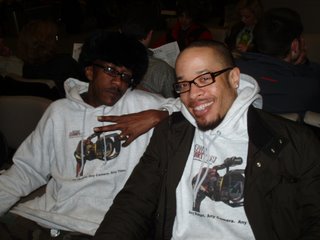This is one of those "duhhh" bits of advice, but it nevertheless seems to elude many indie filmmakers on a regular basis. What I am about to tell you is life advice that you will find helpful in getting any number of things or outcomes that you desire. It has served me well since Junior High School and I've never regreted applying it to any given situation. Are you ready for this bombshell? Here goes:
Whenever seeking the help of another person or organization you should always try to create a win-win situation that will benefit both you and them.
That's it. That's my mind-blowing filmmaking revelation. Let me elaborate. (I promise, I'm keeping this post short.) Too often I am consulted by young filmmakers who plan or are in the process of approaching some organization or person to get some thing for free. It might be an equipment donation, a free location, a sponsorship, an introduction, etc.
 (PHOTO: One of my guerrilla allies, Director/Producer Pete Chatmon, of the upcoming film "Premium". I help Pete's company Double 7 Films with some of their video and production needs and he helps me with business consultations and introductions for the Down and Dirty DV Project. That's Win-Win, Baby!)
(PHOTO: One of my guerrilla allies, Director/Producer Pete Chatmon, of the upcoming film "Premium". I help Pete's company Double 7 Films with some of their video and production needs and he helps me with business consultations and introductions for the Down and Dirty DV Project. That's Win-Win, Baby!)A classic amateur guerrilla mistake is to assume that somehow these people will, out of the sheer generosity in their heart, want to help YOU with YOUR project. The reality is that people want to help themselves much more than they want to help someone else. That's just human nature. Always has been.
How often do you go around looking for ways to help other people that doesn't benefit you? (FYI- Doing it just to feel good about it counts as a benefit.) We'd all like to help other people more and in more ways, but we are so pre-occupied with our own needs and problems that we have little extra energy to devote to efforts that solely benefit other people. The most stable and productive partnerships are all win-win. Win-win situations are how you form allies in filmmaking and life. And you need allies for both.
Assess your skills and resources, then assess the people who are in a position to help you further your project and figure out what you may be able to offer that they might need. All you have to do is put yourself in their shoes and pretend you are them listening to your pitch from their perspective then ask, "How will this benefit me?" (not you-me, but you-them).
If you train yourself to look at any given situation from the other person's perspective, you will almost instantly know when you are wasting your (and their) time and you will be able to anticipate where you will get resistance to your requests and how to best overcome it before a single conversation has even taken place.
Approach by focusing on mutual needs. Never pitch something as a favor.
Unless someone owes you a favor, this is a turnoff. By the same token, don't contact someone out of the blue with your idea for how you can do them an unsolicited favor, because they will likely be suspicious and question your motivations. They know you want something in the end and they will just tune out your pitch until they know what it's going to cost them. It's like when a cheery telemarketer calls to tell you that you've just won a "free" trip to a resort and starts telling you about the lovely amenities before telling you the real catch.
Instead, just be honest and approach with a realistic and thought out plan for how you can both help each other. Explain what you need from them and explain how it will benefit them. People respect this kind of honesty and it will take down some of their defenses since they already know what you want and they see that you've taken their situation into consideration as well.
There will be cases where you seemingly have nothing to offer someone, because they have considerably more resources than you already. You should certainly still ask, but don't waste a lot of time begging for things or pleading to convince someone of how great your project will be. Instead look for more suitable people to trade favors with.
 (My long time allies, Rebekah and Christie, who run Filmtrix.org gave me an interview for the Down and Dirty DV Podcast (coming soon) and I'm giving them some additional promotion. That's Win-Win, Again!)
(My long time allies, Rebekah and Christie, who run Filmtrix.org gave me an interview for the Down and Dirty DV Podcast (coming soon) and I'm giving them some additional promotion. That's Win-Win, Again!)Some typical trade offs in guerrilla filmmaking are:
Locations - Exposure
Crew - Experience
Talent - Demo Reel
Equipment - Credit or Experience
Crew (your film) - Crew (their film)
Products - Product Placement
Food - Credit or Exposure
Professional Services - Points on Film
Post Production Services - Points on Film
And the list goes on and on.
Don't look for handouts. Look for allies.
You may be able to scrouge up one or two handouts here and there, but an ally is a powerful long-term resource that will serve your objectives long into the future as you serve theirs. You absolutely can't make a film without them.
And that's all I have to say about that.
-Ant.












No comments:
Post a Comment